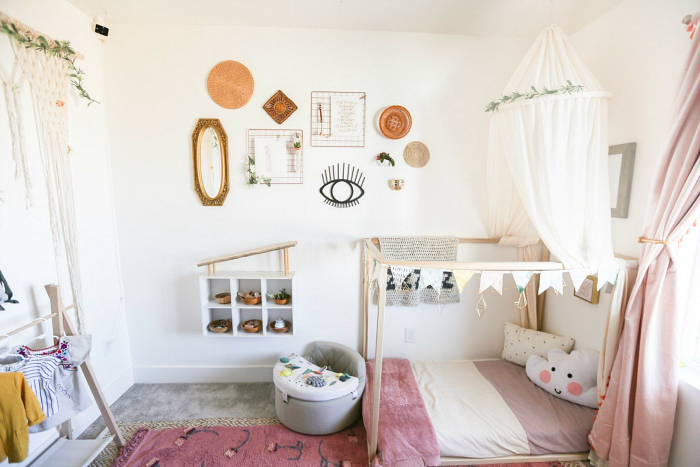Montessori Home
Setting up a Montessori Learning Environment in Your Home

The Montessori approach has been demonstrated to be an exceptional educational system for kids since it helps them learn through self-exploration and emphasizes the overall development of the child. Therefore, Montessori activities are crafted to be simple to set up in a home environment. Consequently, children who are educated through Montessori principles are often more prepared to cope with challenging situations such as the pandemic.
The Montessori approach places great value on the unique learning style, interests, and abilities of each child. The classroom environment is characterized by the teacher acting as a facilitator and guide rather than an instructor. The children are provided with age-appropriate materials and are given the freedom to choose which materials they wish to work with. The teacher helps guide the child in determining which materials are appropriate for their current stage of learning, while the child provides feedback and insights into what materials are most helpful for them.
Montessori Learning Environment in Your Home
Creating a Montessori-inspired home environment involves creating a space that promotes self-sufficiency, self-led learning, and social skills. One way to achieve this is by offering child-friendly tools, such as a secure ladder for accessing the kitchen counter and cooking their meals, or a wardrobe at their height, allowing them to pick and choose their outfits.
Establishing a Montessori environment at home is relatively simple. The setting should encourage children to explore and experiment with the everyday items they encounter. Examples of suitable activities include playthings that have open-ended possibilities or practical life tasks that are easy to set up. The main objective is to provide an environment that nurtures the child’s development while adhering to Montessori principles.
Why Should We Set up Montessori at Home?
The Montessori method also follows a similar approach by promoting tactile learning experiences in a stimulating environment. Research suggests that children who grow up in a nurturing and supportive environment tend to possess better social skills, are more creative, and exhibit greater independence compared to their counterparts. Therefore, parents must create a conducive atmosphere at home to facilitate optimal growth and development in their children.

The Montessori method also follows a similar approach by promoting tactile learning experiences in a stimulating environment. Research suggests that children who grow up in a nurturing and supportive environment tend to possess better social skills, are more creative, and exhibit greater independence compared to their counterparts. Therefore, parents must create a conducive atmosphere at home to facilitate optimal growth and development in their children.
Benefits of Setting up a Montessori Home Environment
The Montessori method of education has been popular for over a century now and for good reason. This approach to education emphasizes independence, self-direction, and self-motivation, and it has been shown to be incredibly effective at helping children develop the skills and knowledge they need to succeed in life. But did you know that the Montessori method is not just for schools? In fact, there are many benefits to setting up a home environment in line with Montessori principles. In this blog post, we’ll explore some of those benefits and explain how you can start implementing Montessori principles in your own home.
1. Encourages Independence
One of the key tenets of the Montessori method is to encourage children to be independent. This means allowing children to make their own choices, take on responsibilities, and learn at their own pace. By setting up a home environment that is conducive to independence, you can help your child develop a sense of autonomy and self-confidence that will serve them well throughout their lives.
2. Fosters Creativity and Imagination
Another important aspect of the Montessori method is its emphasis on creativity and imagination. Montessori classrooms are designed to be open and airy, with plenty of natural light and spaces for children to explore and experiment. By creating a similar environment in your home, you can encourage your child to be creative and imaginative, which will help them develop problem-solving skills and a love of learning.
3. Builds Self-Discipline and Responsibility
Montessori classrooms are known for their ordered and structured environments, which help children develop self-discipline and responsibility. By setting up a similar environment in your home, you can help your child learn to take care of their belongings, follow rules and routines, and take pride in their work. This will help them develop the self-discipline and responsibility they need to succeed in all areas of their lives.
4. Supports Hands-On Learning
Montessori classrooms are designed to be hands-on, with plenty of materials and activities that allow children to explore and learn through their senses. By setting up a similar environment in your home, you can support your child’s hands-on learning and help them develop their cognitive, sensory, and motor skills.
5. Promotes a Love of Learning
Finally, the Montessori method is all about promoting a love of learning. By creating a home environment that is conducive to learning and exploration, you can help your child develop a lifelong love of learning that will serve them well throughout their lives.
Tips to start implementing Montessori principles in your own home:
- Create a designated learning area in your home that is free from distractions and filled with materials for your child to explore and learn with.
- Encourage your child to make their own choices and take on responsibilities around the house, such as setting the table or helping with chores.
- Follow a routine and schedule that allows for plenty of time for learning and exploration.
- Provide your child with plenty of opportunities to learn through hands-on activities and experiences.
- Finally, be patient and supportive as your child learns and grows in their own unique way.

Setting up a home environment in line with Montessori principles can have a profound impact on your child’s development and growth. By encouraging independence, fostering creativity and imagination, building self-discipline and responsibility, supporting hands-on learning, and promoting a love of learning, you can help your child develop the skills and knowledge they need to succeed in life. So why not give it a try and see the results for yourself?
>> Read more: Tips on How to Become A Montessori Parent
